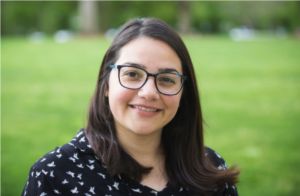1. Tell us a little bit about yourself. Where are you from?
I’m a 5th year doctoral candidate in Latin American History and mother of a 4-year-old. I was born and lived in Brazil for most of my life and migrated to the U.S. along with my husband eleven years ago. We first lived in Charlotte, North Carolina, where I pursued a master’s degree in Latin American Studies at UNCC. Then we moved down to Atlanta in the fall of 2015, after being admitted at Emory. I’m also a singer, musician, and composer and although I haven’t practiced as much as I wanted, I just released a new album.
2. What is your favorite book?
Having read so many books I can’t actually find only one that I like best. So, here is one of my favorites: Signs Preceding the End of the World, a short novel by Mexican writer Yuri Herrera. I read it in its original language, but I heard that Lisa Dillman’s translation to English is as good as the original.
3. What is your favorite thing about Emory/Atlanta?
Being from Brazil and not too fond of the cold, I must tell I enjoy the weather in Atlanta! I also love the diversity of its people, the vibrant music scene, and all the ethnic food options, including the food markets that we have here. And I like the fact that I live in a place called Druid Hills and can walk to campus using the trails of Lullwater Preserve.
4. What are you researching for your dissertation?
My dissertation, entitled Blessed Generation: Youth, Music, and Spirituality in Dictatorial Brazil (1964-1985), examines the emergence of alternative youth cultures in Brazil during the military dictatorship. I argue that young Brazilians have used secular music and alternative religious practices to endure state repression and bridge the political polarization in the country. While the timeframe of my research comprises the whole period of the dictatorship, I focus on the 1970s, when we experienced the so-called economic miracle and the “sufôco”—the Portuguese word for “suffocation,” commonly used to describe the most violent years of military rule in Brazil. By relying on music albums, newspapers, magazines, as well as police archives and governmental documents, my dissertation reveals how musical and cultural practices that were deemed unBrazilian and/or morally subversive coexisted—though not peacefully—with repression and censorship.
5. What interested you about the Woodruff Library Fellowship?
Since I was a kid, I had always entertained the idea of working in a library. COVID-19 has certainly limited my experience, but even working from home it is possible to have an insider view of the library’s dynamics. Second, being digitally savvy is key to succeed not just as a scholar, but also as a person, and mainly as a teacher. Therefore, the opportunities that this fellowship provides to sharpen my digital skills are certainly appreciated. Last, but not least, the chance to connect with authors, researchers, librarians, technology specialists, and editors from various fields is very exciting. I’m sure this experience will come in handy once I start applying to jobs either within or outside the academia.
6. What will you be working on this year for your Woodruff Library Fellowship?
As the 2020-2021 ECDS Fellow, I am working as a Managing Editor for the open access digital journal Atlanta Studies. In addition to overseeing the publication process—which includes soliciting articles and materials, reviewing submissions, and copy-editing—I also help coordinate the journal’s social media communications. In addition, I will develop a digital project of my own, as an extension of my dissertation. I plan to make all the oral interviews and other personal archives that I collected in Brazil available for both Portuguese and English-speaker audiences.

